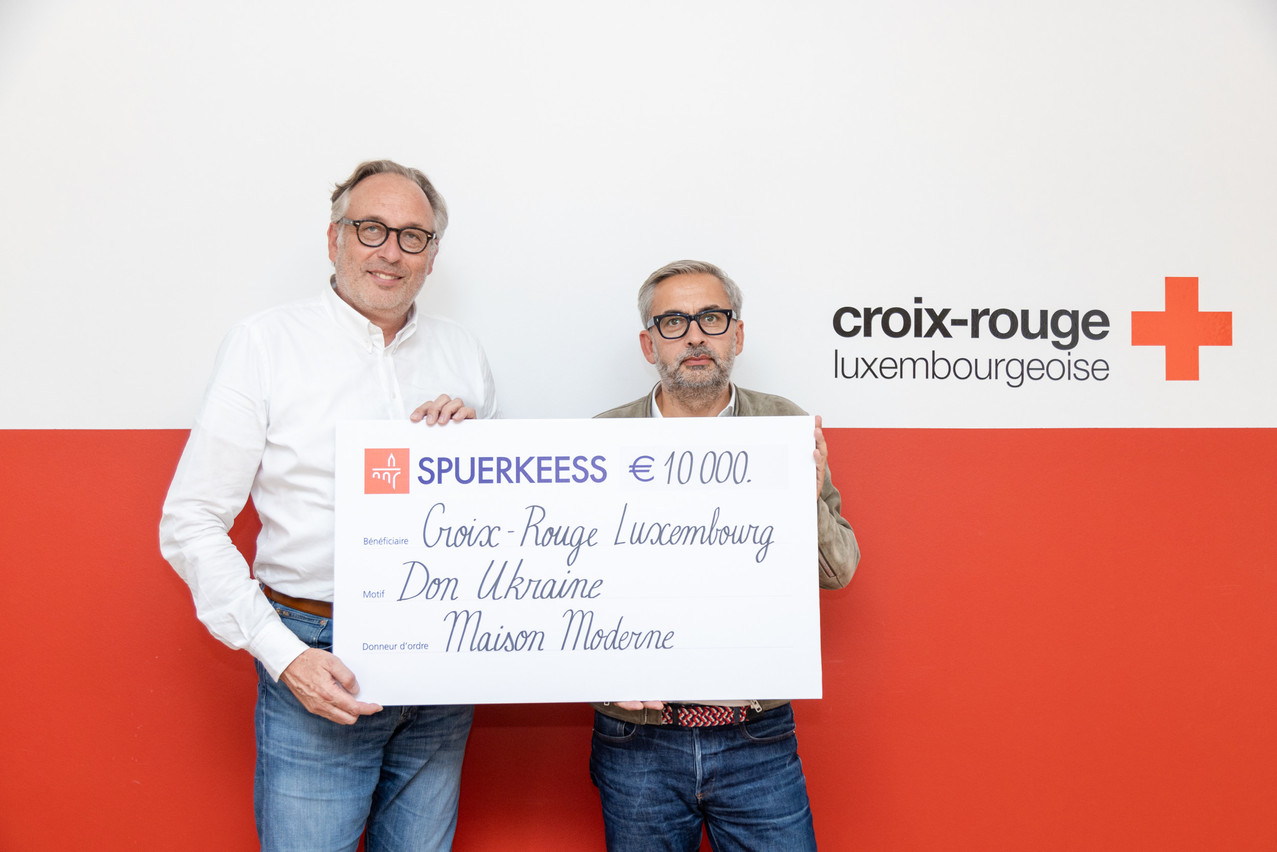The €10,000 donation was presented by Maison Moderne CEO Mike Koedinger to Luc Scheer, head of communications and resource mobilisation at the Red Cross on 13 September 2022.
It is the result of a promise made by Maison Moderne to readers in the summer of this year, that if 2,000 participated in an online media survey, Maison Moderne would donate €10,000 to the Red Cross.
For Koedinger, supporting the Red Cross is important both on philanthropic but also on free press grounds.
"The conflict in Ukraine shows once again that freedom of expression--and the media in general--are at risk when democratic values are threatened. At Maison Moderne, we wanted to support the victims of the conflict with this donation to the Red Cross.”
He noted that "We finally reached the number of 1,460 participants and decided, in view of the emergency in Ukraine, to make the donation anyway. This is just a drop in the ocean, so I would like to take this opportunity to appeal for donations from readers and organisations."
Where the money goes
The conflict in Ukraine has particularly torn at the heartstrings of those living in Luxembourg, many of whom are expatriates living far from their extended families and operating in a language other than their mother tongue.
According to Scheer, the response of Luxembourg was to open their homes to the thousands of refugees who have arrived in the country since February. The important role of the Red Cross is to make this temporary housing situation more sustainable for both the refugees and the hosts.
“We’re now working on a housing strategy,” said Scheer. “Housing is a huge issue for so many categories of the population already and we’re investing in finding solutions.”
Landlords generously offered empty properties free of rent for six months when the first refugees arrived, noted Scheer. However, this is not a sustainable solution for a landlord who eventually wants rental income.
“We’re working to convert the free rental into a rental agreed on the basis of social criteria,” said Scheer. “We can give the ‘Lisko’ guarantee (Lëtzebuerger Integratiouns a Sozialkohäsiounszenter, the Luxembourg Centre for Integration and Social Cohesion) for the first year, then when the landlord feels comfortable, this can be progressively withdrawn.”
The Red Cross also works on the ‘softer’ sides of housing support, working to solve problems and misunderstandings that arise between refugees and their host families, or refugees and their host communities.
It is important to be aware that the pressures of the upcoming winter will affect many people in Luxembourg, and not only refugees. “We are focusing on what we will need to do to face the social impact of this winter in Luxembourg. This includes the psychological impact on those who support our donations,” said Scheer, citing those that may find themselves in financial hardship and feel less generous towards refugee communities than they might otherwise be.
International work
Scheer likens some of what the Red Cross does internationally to the army. “We’re not carrying weaponry but our trucks run along the same routes [in Ukraine] as the army.”
This army approach means that what is being donated is essential supplies, and these are not always pretty. “We have supplied a lot of body bags to Ukraine. These are big ticket orders. Body bags are important. They are important for hygiene and important for human dignity.”
A similar practical approach was taken early in the crisis with the shipping of blankets. “We ordered blankets that don’t burn, keep you warm, and dry out quickly.”
These examples are of specialist equipment designed to make the biggest positive impact. While people often collect blankets and clothing themselves, Scheer advises that donating time and money can be preferable to donating objects.
“Involving yourself in helping refugee children with language or homework, encouraging your business to do job coaching, these are very helpful ways to really make a big difference to refugees,” he said.
In terms of work outside of Ukraine, the Red Cross is also focusing on the humanitarian crisis as a result of the floods in Pakistan, where up to 32 million people have been displaced.
Maison Moderne and a history of philanthropy
A significant donor to the Red Cross and the creator of Maison Moderne’s namesake, the former department store on the corner of grand rue and côte d’Eich, , has been a source of inspiration to Koedinger and Scheer.
“He supported young people,” recalled Scheer.
“He was one of my first clients,” said Koedinger. “We took over the name of Maison Moderne as a homage.”
Koedinger remembers how Brahms once gifted him a work of art from his own personal collection. In the same spirit, Koedinger eventually gifted the piece to Luxembourg’s art museum Mudam.
“I said the gift had come from Maison Moderne so it didn’t directly implicate Pierre, but in a way it did,” said Koedinger.
The same spirit of generosity hopefully lives on in Maison Moderne with this donation and many future ones.
